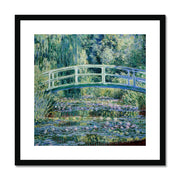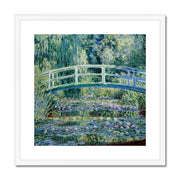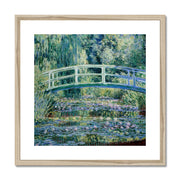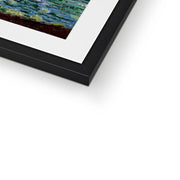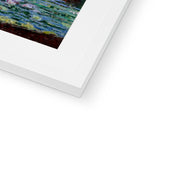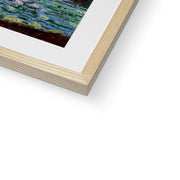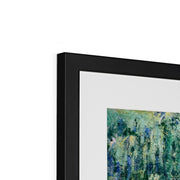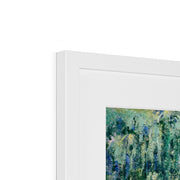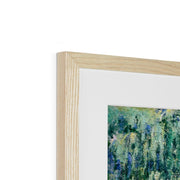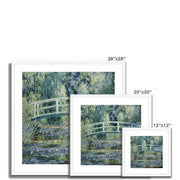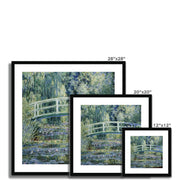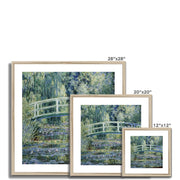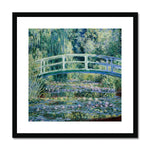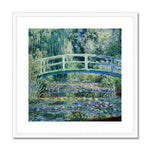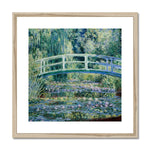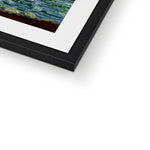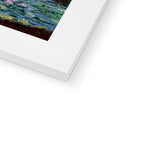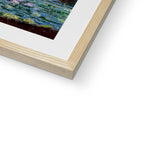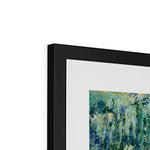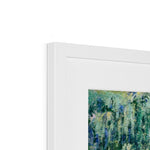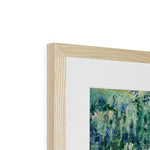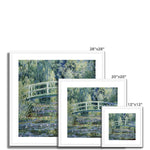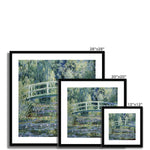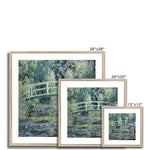Artist: Claude Monet
Created from high-quality wood, milled with simple clean lines and presented with a satin finish. Includes an off-white mount that will not discolour or fade with age. - Simple, elegant design - Premium, fine art paper with a gently textured surface - Handmade by specialist picture framers - FSC certified off-white mat / window mount - Delivered ready for hanging
"Water Lilies and Japanese Bridge," painted by Claude Monet in 1899, is a masterpiece that encapsulates the essence of the Impressionist movement. This painting is part of a series of around 250 oil paintings that Monet created, focusing on the water lily pond in his garden at Giverny, France. The painting is currently housed at the Princeton University Art Museum.
At first glance, "Water Lilies and Japanese Bridge" is a stunningly tranquil and immersive representation of Monet's beloved garden. The focal point of the painting is the Japanese bridge, gracefully arching over a pond filled with clusters of blooming water lilies. The bridge, with its smooth curves and muted green color, blends harmoniously with the surrounding verdure.
Monet employs a palette dominated by various shades of green, yellow, and blue to create a symphony of color. Dabs and strokes of paint give the surface a textured, almost tactile feel, making the foliage appear alive with movement. The water lilies float serenely on the water's surface, reflecting the diffuse light of a gentle, overcast sky. The pond itself captures the subtle interplay of light and shadow, with reflections that create an almost mirrored effect.
Monet's brushwork is both deliberate and spontaneous, epitomizing the Impressionist technique. Quick, successive strokes capture the play of light and the ephemeral nature of the scene, while the overall composition captures a sense of depth and tranquility. The loose handling of paint, especially in the foliage around the pond, imbues the scene with an ethereal quality, emphasizing the beauty of natural imperfection.
Claude Monet (1840-1926) was a founding figure of the Impressionist movement, a group of artists in late 19th-century France who sought to capture fleeting moments and the effects of light. Monet's interest in changing light and color, as well as his focus on the depiction of nature, are hallmarks of his work.
"Water Lilies and Japanese Bridge" belongs to Monet's later period when he increasingly focused on the water garden he designed at his Giverny home. This series marked a significant departure from his earlier work which often depicted more grandiose views of Paris and other famous locales. In contrast, his water lily series is introspective, concentrating on the microcosm of his own creation.
Interestingly, the sheer scale and repetition of his water lily series allowed Monet to deeply explore the nuances of light, season, and weather, making each painting a unique study despite their shared subject matter. This period was also marked by Monet's struggle with cataracts, influencing his perception of color and form, which some art historians argue contributed to the increasingly abstract quality of his work during this time.
The Princeton University Art Museum, where "Water Lilies and Japanese Bridge" is housed, provides the perfect environment for viewing this quintessential piece. The institution not only conserves this artwork but also offers context through its broader collection of Impressionist art, allowing viewers to understand Monet’s monumental contributions to this pivotal artistic movement.
1. Interplay of Light and Color: Monet’s masterful use of color to capture the subtle shifts in light is a defining feature of this painting. The rich tones of green foliage against the soft pastels of the water lilies offer a vivid representation of natural beauty.
2. Brushwork: The painting showcases Monet’s signature brushwork—loose, yet meticulously placed strokes that give a sense of movement and life to the scene. This technique is a key characteristic of the Impressionist style, breaking away from the detailed precision of academic painting.
3. Atmospheric Quality: The painting exudes a sense of calm and serenity, a reflective pause that invites the viewer into Monet’s intimate garden. The stillness of the water juxtaposed with the gentle arch of the bridge creates a balanced and serene composition.
4. Personal Significance: The garden at Giverny was not just a subject for Monet but a passion project, meticulously designed by the artist himself. This personal investment is evident in the loving attention to detail and the idyllic yet realistic depiction of the garden.
In summary, "Water Lilies and Japanese Bridge" is more than a painting; it is a window into Monet’s world, his love for nature, and his relentless quest to capture its fleeting beauty. This work stands as a testament to his innovative spirit and remains a cherished piece of art history.
Shipping & Returns Policy
At PrintsDirect we take great pride in delivering a seamless experience to match the exceptional quality of our fine art prints. Here, you'll find everything you need to know about how your artwork makes its way to you and what to do should you need to return it.
Prompt and Secure Shipping
We understand the anticipation that comes with purchasing a special piece of art. That’s why we aim to deliver your order swiftly and securely. Once dispatched, your print will be shipped via FedEx from one of our four strategically located facilities in the UK, US, Netherlands, or Australia, ensuring the shortest possible delivery time to your address.
In most cases, your artwork will arrive within three business days of shipping. While delivery times may occasionally vary based on location or external factors, rest assured that we prioritize efficiency at every stage of the process.
Expertly Packaged for Protection
Every print is carefully prepared for transit to ensure it arrives in pristine condition. Your framed artwork will be meticulously wrapped in bubble wrap and housed in a rigid corrugated cardboard box designed to provide maximum protection. We treat every piece as if it were destined for our own walls, so you can have confidence that your artwork will arrive in impeccable condition.
Returns Policy
We want you to be completely satisfied with your purchase. If, for any reason, you’re not, we offer a 30-day return policy. Should you wish to return an item, simply ensure it is in its original, undamaged condition.
For returns, we kindly ask that customers cover the cost of return shipping unless the artwork is found to have been defective upon delivery. If there is an issue with the quality of the piece upon arrival, please contact us immediately so we can resolve the matter swiftly and to your satisfaction.
We are committed to ensuring that every aspect of your experience with us reflects the care and craftsmanship of the artwork itself. Should you have any questions or require assistance, our dedicated team is always available to help.
YOU MIGHT ALSO LIKE
RECENTLY VIEWED PRODUCTS


